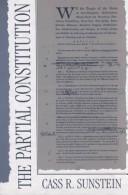Check nearby libraries
Buy this book

American constitutional law is at a crossroads. In a major new interpretation of the Constitution, Cass Sunstein offers a clear account of our present dilemmas and shows where we might go from here.
As it is currently interpreted, the Constitution is partial, Sunstein asserts. It is, first of all, biased. Contemporary constitutional law treats the status quo as neutral and just, and any departure as necessarily partisan. But when the status quo is neither neutral nor just, Sunstein argues, reasoning of this sort produces injustice. The Constitution is also partial in another sense: its meaning has come to be identified solely with the decisions of the Supreme Court.
This was not always the case, as Sunstein demonstrates; nor was it the intention of the country's founders. Instead, the Constitution often served as a catalyst for public deliberation about its general terms and aspirations - and Sunstein makes a strong case for reviving this broader understanding of the Constitution's role
.
In light of this analysis, Sunstein proposes solutions to some of the most hotly disputed issues of our time, including affirmative action, sex discrimination, pornography, "hate speech," and government funding of religious schools and the arts. In an especially striking argument, he claims that the equal protection clause of the Fourteenth Amendment - not the right to privacy - protects a woman's right to choose abortion.
Sunstein connects these and other debates to the Constitution's historic commitment to public deliberation among political equals - and in doing so, he reconceives many of our most basic constitutional rights, such as free speech and equality under law. He urges that public deliberation about the meaning of the Constitution in turn be freed from a principle of neutrality based on the status quo.
His work points to a historically sound but fundamentally new understanding of the American constitutional process as an exercise in deliberative democracy.
Check nearby libraries
Buy this book

Previews available in: English
Showing 3 featured editions. View all 3 editions?
| Edition | Availability |
|---|---|
|
1
The Partial Constitution
August 19, 1998, Harvard University Press
Paperback
in English
- Rei edition
067465479X 9780674654792
|
zzzz
Libraries near you:
WorldCat
|
|
2
The partial Constitution
1994, Harvard University Press
in English
- 1st Harvard University Press pbk. ed.
067465479X 9780674654792
|
cccc
Libraries near you:
WorldCat
|
| 3 |
aaaa
Libraries near you:
WorldCat
|
Book Details
Edition Notes
Includes bibliographical references (p. 357-403) and index.
Classifications
The Physical Object
ID Numbers
Community Reviews (0)
Feedback?| July 24, 2024 | Edited by MARC Bot | import existing book |
| August 19, 2020 | Edited by ImportBot | import existing book |
| July 31, 2020 | Edited by ImportBot | import existing book |
| February 28, 2020 | Edited by MARC Bot | remove fake subjects |
| December 9, 2009 | Created by WorkBot | add works page |











